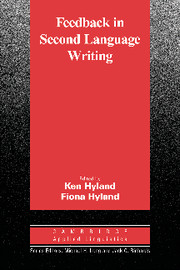Book contents
- Frontmatter
- Contents
- Contributors
- Series editors' preface
- Preface
- Chapter 1 Contexts and issues in feedback on L2 writing: An introduction
- I SITUATING FEEDBACK: SOCIOCULTURAL DIMENSIONS
- Chapter 2 Sociocultural theory: A framework for understanding the social-cognitive dimensions of peer feedback
- Chapter 3 Cultural issues in peer response: Revisiting “culture”
- Chapter 4 Appropriation, ownership, and agency: Negotiating teacher feedback in academic settings
- II SHAPING FEEDBACK: DELIVERY AND FOCUS DIMENSIONS
- III NEGOTIATING FEEDBACK: INTERPERSONAL AND INTERACTIONAL DIMENSIONS
- Author index
- Subject index
Chapter 4 - Appropriation, ownership, and agency: Negotiating teacher feedback in academic settings
Published online by Cambridge University Press: 05 October 2012
- Frontmatter
- Contents
- Contributors
- Series editors' preface
- Preface
- Chapter 1 Contexts and issues in feedback on L2 writing: An introduction
- I SITUATING FEEDBACK: SOCIOCULTURAL DIMENSIONS
- Chapter 2 Sociocultural theory: A framework for understanding the social-cognitive dimensions of peer feedback
- Chapter 3 Cultural issues in peer response: Revisiting “culture”
- Chapter 4 Appropriation, ownership, and agency: Negotiating teacher feedback in academic settings
- II SHAPING FEEDBACK: DELIVERY AND FOCUS DIMENSIONS
- III NEGOTIATING FEEDBACK: INTERPERSONAL AND INTERACTIONAL DIMENSIONS
- Author index
- Subject index
Summary
I recently attended a new faculty seminar at my university, at which everyone was asked to describe a person or event that had led us into the field of teaching. Our seminar leader began by sharing his experience in attempting to publish his first paper. He described receiving his draft from his dissertation advisor and being horrified initially to find it covered in red ink with “not a line untouched.” But after reading through the comments, he was struck with a feeling of amazement that his advisor had cared enough about his work to so fully invest his interest and time in responding to the draft. As we worked our way around the seminar room, one of my new colleagues shared another story that seemed to counter the paper-saturated-in-red-ink story that had begun the discussion. He described an English teacher who wrote next to nothing on his papers. Despite his initial disappointment at not receiving the feedback he had wanted and expected, he found that the teacher's minimal response had freed him to write and given him a sense of independence that eventually led him to believe in his own writing. These two stories interested me because they illustrated such dramatically different approaches to teaching and responding to writing, yet had equally strong, positive impacts on the writers.
Just over a decade ago, Reid (1994) examined what she called the “myths of appropriation” – the seeming dichotomy of under-responding and over-responding to texts, specifically addressing the prevailing fear of taking away ownership of, or appropriating, students' writing. In the time since Reid's article, the term appropriation has not disappeared from discussions of feedback.
- Type
- Chapter
- Information
- Feedback in Second Language WritingContexts and Issues, pp. 60 - 78Publisher: Cambridge University PressPrint publication year: 2006
- 10
- Cited by

